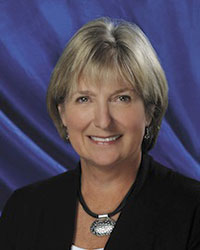
Sue Sharpe, Chuckanut Health Foundation
On the job since: 2008
Foundation founded: 1982
Geographic ccope: Whatcom County, Washington
Grants Made in 2015: $500,000
Staffing: 2 FTE
How has your career prepared you for your current role?
My 35-year career has included both nonprofit and health care experience which has all been vital to informing my current role. The first 20 years were spent in hospital health care planning and executive positions in Bellingham, Washington and Alexandria, Virginia which gave me a strong foundation in the medical system and an understanding of both the opportunities and the limitations for improving community health through that system.
From the late 90’s until 2008 I was an independent consultant with a practice focused on community based planning and nonprofit organizational development. I was leadership consultant and facilitator for the development of the Whatcom Alliance for Healthcare Advancement from 2002-2008 and interim executive director for the Whatcom Community Foundation in both 2005 and 2007.
Both of those experiences ignited my passion for working with community based groups that engage diverse stakeholders to promote community health improvements for all and a belief that local communities and their funders are best equipped to support and encourage those changes.
What are the most important health issues in your community?
As a community and a foundation we are guided largely by the Whatcom County Community Health Improvement Plan (CHIP) as well as the Healthier Washington Initiative at the state level.
Our community is committed to investing in healthy children and families through support of early childhood and family support services including health, education, housing and food access. The Healthy Places initiatives focus on community engagement to support efforts in specific neighborhoods and schools where there are significant health disparities.
The Whole Person Health Initiative integrates medical, behavioral and oral health that is patient centered and culturally competent. All of this work is done through an equity lens.
What are your core strategies for addressing these health issues?
Chuckanut Health Foundation has restructured its grant guidelines and priorities to reflect the community priorities with a particular focus on early childhood and family support services, behavioral health initiatives, oral health integration and expansion, end of life and healthy aging as well as supporting our community’s response to the Healthy Washington roll out.
We fund the backbone support for the Community Health Improvement Plan, fund community joint learning opportunities by supporting local delegations to attend national conferences or bring in keynote speakers, serve as convener when appropriate and participate daily as a partner in the community discussion to identify community informed opportunities.
As a foundation with an explicit mission to serve a community, how do you include that community as an integral partner in your work?
We stay engaged with our funding partners, have them participate in our strategic planning and serve as a partner in the larger community discussions around community health. We see it as our responsibility to be part of the community dialogue and encourage community voice. We yet to diversify our board and committees to reflect the broader community we serve.
What’s been a recent big success for your organization and what excites you about it?
The Chuckanut Health Foundation launched a major reorganization and realignment of our mission and vision in 2013 and 2014 that informed our new name and brand and gave us a clarity of purpose that “invests our experience and resources in strengthening and advancing individual and community health.” That was a gamechanger for us at all levels from strategic planning and grantmaking to community engagement. It has resulted in increased funding for oral health, behavioral health, childcare, housing and advanced care planning while engaging a new and broader group of community partners.
Our funding changes were significant but co-locating with Whatcom Community Foundation and United Way into new space known as the Whatcom Philanthropy Center holds the greatest promise. In addition to providing expanded space and support for local nonprofits it has facilitated joint planning, shared funding of the CHIP and a collective funding response to important community needs.
What’s the single biggest challenge your organization is tackling right now?
Linking our legacy funding of healthcare system improvements to positive impacts on population health that addresses health disparities. It requires quality data, partner transparency and a solid commitment to community voice.
What are the most important public policy issues for you this year, and what are you doing about them?
Chuckanut Health Foundation is committed to continuing its work with the Health Philanthropy Partnership (originally convened by Philanthropy Northwest) to influence the development and effectiveness of the Accountable Community of Health strategy in Washington state. This is vital to insuring that health reform actually produces improved health.
We will also continue to work with our public and private partners to define and support policies that incorporate equity and community health into our community investments regardless of the sector.
What’s one more question we should ask you, and how would you answer it?
You should ask me: How important is our work as health funders?
Community based health philanthropy is more crucial today than ever before to provide financial support and a voice that insures policy changes and realignment of healthcare system resources that results in health benefits to the communities they serve.
Sue Sharpe is CEO of the Chuckanut Health Foundation, joining us this month for our virtual roundtable with healthcare conversion foundation leaders.